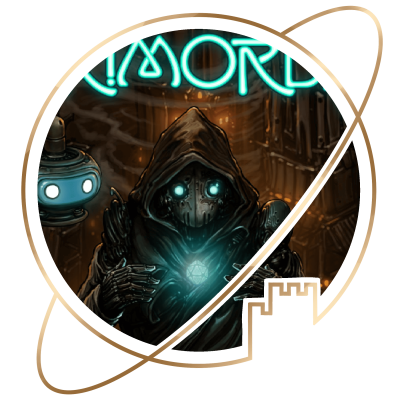- Video game developed by Wormwood Studios
- Directed by Mark Yohalem
- Published by Wadjet Eye Games
- Published in 2012
- Point-and-click adventure
- Playing time: 6-8 hours
- Platforms: Microsoft Windows, MacOS, Linux, iOS
Primordia is a beautiful and atmospheric point-and-click-game, following the story of Horatio Nullbuilt, an android living in a crashed ship in the desert wasteland, who has his life turned upside down when a hostile robot steals his ship’s power core. Horatio is determined to scavenge the post-apocalyptic wasteland for a new core, but Crispin, his self-built sidekick, suggests that perhaps it would be easier to find one in Metropol, the city of glass and light…


One would think that if there is one genre of video game that is well past its prime, it is the point-and-click adventure. Until a couple of years ago, I would’ve guessed that nobody would still be making them. I now know that that’s not true – and that great point-and-click games are still being created today.
One example is Primordia. It is 100% a classic point-and-click game. The gameplay is as you’d expect: your character travels a post-apocalyptic landscape consisting of detailed single screen environments, and interacts with the world by clicking on the objects and characters he encounters there. You progress through the game via a set of simple logic puzzles that require you to find things, fix things, bring characters certain objects, and answer questions. Most of the puzzles are easy enough to solve, but some are a bit trickier. Like any point-and-click game, you’ll find yourself endlessly clicking elements of the world to see if they come loose, and whenever you add a new object to your inventory, you’ll want to go back to earlier screens to see if it can be useful there. Like any point-and-click game, there are moments where the gameplay devolves into a rather cynical ‘rub x on y’, to see if anything happens. Luckily, the game allows you to ask Crispin for hints, and none of the puzzles seemed unfair in hindsight – though trying to speed through it in one sitting is bound to become frustrating. Every now and then, a eureka moment is required – I initially played with a friend, and I remember calling him while cycling home to ask if he could try looking in that one spot because I thought we might have missed that… and bingo! I love the game for those moments: it offers simple, laid back, but quality gameplay that can also be fun to share.
The game’s primary appeal, however, is its aesthetic. The world is built up out of beautifully drawn environments and great pixel art characters and objects. Primordia has a great atmospheric soundtrack, sucking you into the world. I find myself still listening to it from time to time when I want something relaxing on in the background. The voice acting is also great, especially the little conversations between Horatio and Crispin. Little elements like those forge a surprisingly deep bond between the player and the characters for how simple the game is.
The point-and-click experience is not for everyone. However, this style of game is also especially well-suited to people that don’t like the flashy speed of modern gaming, people that don’t consider themselves ‘gamers’, but might be interested in a stress-free interactive puzzling experience with great characters and art. My parents, for example, loved playing Primordia together.
Overall, Primordia is near the top of my list of favourite games, which I think is a wonderful achievement for such a simple game that can be picked up for less than ten euros.
To give you one tip for your playthrough: when in doubt – plasma torch.

Peter just couldn’t stop pestering me about this game, recommending it at every opportunity he got. It was only a matter of time before I would succumb. And I’m grateful for his perseverance.
Primordia is a fairly simple point-and-click puzzle game, embellished with atmospheric music and pixel art. It transports us to a post-apocalyptic world in which humans have made way for their robot inventions. As a player, you control Horation Nullbuilt, an android scavenger living in a stranded airship with his own robot companion.
Horatio, having a gruff voice but (depending on your choices) soft-hearted demeanor, reminded me a lot of Geralt of Rivia. This made it easy for me to like him and get invested in his story and the world he lived in, which both have a lot more depth to them than at first appeared. At times grim and sad, but also full of light-hearted moments and silly humor. It’s impressive how – in both its storytelling and worldbuilding – Primordia is extremely efficient, only using the bare minimum to craft a fulfilling narrative. And if that’s not enough, there are also multiple endings available, dependent on choices you make throughout the game.
The puzzles in this game can be challenging at times, but if you let the wheels in your head turn long enough, it’s unlikely you’ll never beat them, one way or another. If I were to give a hint, it would be the heads-up that the map in your data pouch can be used for fast travelling. I only discovered this helpful mechanic quite late…
I won’t pester you to play this game, but honestly? You would deserve it.





